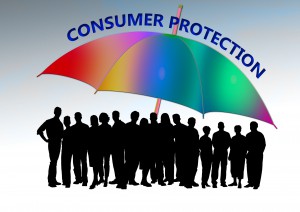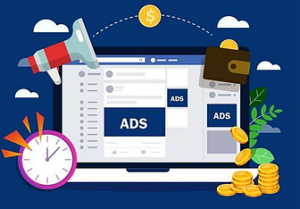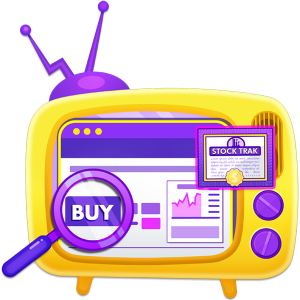Protect Yourself as a Consumer
Every time you buy something, you are considered a consumer. The noun consumerism refers to the idea that spending money and consuming goods is good for our economy. Because you are willing to spend money on goods and services, businesses can produce items, people can have jobs, money can flow, and our economy expands.
As the world’s economy grows, each person is involved in more and more transactions. The rights and responsibilities of being a well-educated consumer are more important now than ever before.
What are Consumers?
If you buy something and use it, you are a consumer. If you make and sell something, you are a producer. Of course, most people are both – working as producers and buying as consumers. Just like businesses have certain responsibilities and practices they need to keep in mind, consumers have responsibilities to make sure they are not being taken advantage of. In the United States, every consumer has certain rights to ensure they get a fair deal. The most fundamental consumer right is the right to complain. This may not sound important, but it can have a much bigger impact than you would expect.
Consumer Rights
Implied Rights

An implied warranty means that when a company sells a product, they are selling a defect-free product. If you take it home only to find it does not work, you have the right to go back to the store and ask for a replacement. Unless the product comes with a warranty, the store may not be obligated to give you a free replacement. However, businesses prefer to keep their customers happy, so they will likely exchange your item for you.
Most front-line employees have a set of guidelines to follow as they work with customers who have product quality or service issues. If you feel your issue is not being taken seriously as you talk with a lower-level employee, you can always ask to speak to a higher-level employee, such as the salesperson who worked with you or a manager. If you can demonstrate that the business willingly sold you something broken or defective, the sale may be considered fraud. Fraudulent business practices have their own set of consequences and regulations, so definitely report issues to the Better Business Bureau or the Federal Trade Commission.
You also have the right to leave negative feedback and reviews on review websites. Share your honest thoughts about your experience or purchase, but be professional and not offensive with your review. Again, this might seem like a small consolation, but companies (especially those doing business online) rely heavily on positive customer reviews, so speaking up can end up having a larger impact.
Explicit Rights
Explicit rights are the rights that are guaranteed through a contract or by law.
Warranty
Besides the implied warranty that comes with a product purchase, many products also come with an explicit warranty. This warranty is usually written and includes information about how any product or service defects will be handled by the manufacturer or the retailer if the product does not function as originally described or intended. Most often if you experience a product issue, you will be asked to show proof of purchase (the original receipt). Then the business will repair or replace the defective item. In today’s electronic age, your sales receipt may include the warranty information, or the information sheet accompanying the product will provide instructions about the terms of the warranty. If you have a warranty, along with a proof-of-purchase (including a receipt), you may be able to explicitly request the seller fulfill the terms of the warranty by offering repair or replacement. If they refuse, you have a further legal right to sue in a small-claims court.
Financial Agreements and Loans
When you take out a loan, you enter into a legal contract that protects both you and the lender. This agreement defines the legal responsibilities of borrowers and lenders.
- Lender’s Responsibility: The lender is legally required to clearly disclose all terms of the loan, including the interest rate (APR), fees, and payment schedule. They must follow all consumer protection laws.
- Borrower’s Responsibility: The borrower is legally responsible for repaying the loan according to the agreed-upon terms and schedule.
This formal agreement is how both consumers and financial institutions benefit from the exchange; the consumer gets the funds they need, and the lender is legally protected in their right to be repaid, earning interest for the risk they took.
Legal Obligations
Several types of purchases have even more consumer protections by law. These include:
- Car Sales – These protections differ for each state, so check with your state’s consumer protection office to find out your explicit protections.
- Phone, Television, and Other Utilities – Public utilities have strict regulations over billing and service requirements. If you think that your utility provider is not fulfilling their obligations, you can contact your local franchising authority, the FCC, or even the Public Utility Commission.
- Banks and Lending Institutions – The banking industry likely has the strongest consumer protections in the United States, governed by several authorities. If you have a consumer dispute with a bank that cannot be handled by simply talking with the manager, visit the USA.gov resource center for more options.
- Airports – Each person has certain rights when travelling, including protections against discrimination, safety, and security at an airport. After you reach your destination, there are further protections for hotel stays. For example, if you get bed bugs, you may be entitled to compensation. Like banks, hotel regulations differ by state, so visit the USA.gov resource center for more information.
- Housing – Each person has many rights to housing, at every level of government (local, state, and federal). This includes protection from discrimination, and in some cases controls on how high the rent can be raised per year.
- Fairness in Lending – The Equal Credit Opportunity Act (ECOA) is a federal law that makes it illegal for any creditor to discriminate against a credit applicant on the basis of race, color, religion, national origin, sex, marital status, or age.
If you believe you have a consumer complaint, the most important documents will be your receipts. Generally speaking, regulatory agencies require you to try to resolve any issue directly with the business before they get involved, so you should send the business your complaint in writing before trying to get additional help.
If you do need help with your consumer complaint, the best places to start are the Consumer Financial Protection Bureau (CFPB), the https://www.usa.gov/consumer-complaints, and the Better Business Bureau.
Consumer Responsibilities

Consumers do not have a large number of implied protections. This is, in part, because business law is centered on the “reasonable person“ standard. This standard focuses on the idea of “what would a reasonable person do in this same situation?” Consumers are expected to put some thought into each purchase to make sure they really want to do it. If a consumer spends $9,000 on an iPhone game (which a consumer reported in 2015) before realizing how much money he was losing, he will not have many legal protections (unless he can demonstrate that the game was fraudulent in some way). Consumer protections are not designed to prevent consumers from making bad decisions. It is the duty of every consumer to make rational, reasonable choices when choosing their consumption. The easiest way to do this is to build a spending plan and stick with it.
Consumer Decision Making
A large part of “consumerism” is based on the idea that most consumers are reasonable people and make reasonable decisions. This means that you cannot sue the makers of Cap’n Crunch for false advertising because “crunchberries” are not a real fruit – a reasonable person would not make that kind of assumption. Instead, it is left up to you, the consumer, to make efforts at researching products and services before you buy them.
Below are some of the different places where you might find information about a product, along with the “pros” and “cons” of each source.
Company’s Own Advertising

Pros:
- There are “truth in advertising” laws, meaning that it is rare for companies to outright lie in an advertisement.
- The company selling something will communicate the strong points of a product. Especially for new stuff on the market, other sources of information might just be based on the company’s own advertising before independent research can be done.
Cons:
- Most likely, you will not find any of the downsides or drawbacks to the product.
- Advertising will also not give you any idea what alternatives for this product exist from other sellers.
- While advertisers will not “lie” directly in an advertisement, they can do some manipulation of the truth to make themselves seem better than they are.
Customer Reviews

Pros:
- Reviews from other buyers should be a good way to see if other people in your position were happy with their purchase.
- For popular products, there can be hundreds or thousands of reviews, with a simple “star” metric to show how happy others were, letting you compare many products at a glance.
Cons:
- Customer reviews are often short and lack information, making it hard to identify if the product does exactly what you expect.
- There is no “truth in reviews” laws, which means people can, and do, post false information in product reviews. This makes it very important to read many reviews before making a decision.
- There are many fraudulent sellers that “buy” reviews from shady organizations that post hundreds or thousands of fake reviews in order to improve the overall “rating”. Try to find reviews from “verified buyers”, ideally who have posted their own pictures.
Blog Posts / Expert Reviews

Pros:
- Largely independent reviews from people who know what they are looking for can be a great deep-dive on potential products.
- Reviewers usually include side-by-side comparisons with several alternatives, weighing the pros and cons of each.
Cons:
- Most of the time the reviewer will include “affiliate links” to each product, where they earn a commission any time someone clicks it and buys something. This means they have a strong incentive to convince you to buy something, and not much incentive to talk you out of it.
- Because of this “affiliate” problem, it could be that some of the supposed expert reviewers have never actually used the products they are reviewing, and are just trying to make some affiliate cash. This can make it hard to know which experts to trust.
Customer Decision Making – Best Practices
Putting this all together, here is a sample checklist to go through when considering your next big purchase to make sure you make the right decision.
Prior Research
You will usually be first introduced to a product through a company advertisement in some shape or form. Otherwise, how would you know that you wanted it?
- Check Out Advertisements. Even if you hear about a product or service from friends, family, or some other source, it is smart to check the official website from the company who makes it. This might not have the negatives, but likely will have a complete “feature list”.
- Find Expert Blog Posts. Sure, many will have lots of affiliate links, but they will also have a detailed comparison against some other alternatives. Make sure you read up on the alternatives too. You may discover a competitor’s product is a better option for your needs.
- Read Reviews. Last step, read up some online reviews to make sure actual buyers agree with the expert assessments. Try to find reviews from places that verify if the buyers are real, and (if possible) include pictures or videos taken from regular people who bought the product just to make sure the expert reviews were legitimate.

When Purchasing
When you decide to go forward with the big purchase, where you buy can have a big impact. The “Expert Blog Posts” are often a good place to start because the affiliate offers usually come with coupon codes for a discount.
Depending on the purchase, it can make more sense to find a physical store than to buy online. For example, buying clothes or shoe brands you have not tried before might be easier in person to make sure the sizing is what you expect.
The Final Word
Taking all of these steps is not just to make sure you get a good deal, it is also your main protection against fraud. It is MUCH easier to avoid scams and fraudulent purchases by doing your research before you buy than trying to clean up the mess afterward.
You should never feel pressured to make a purchasing decision RIGHT NOW – both phone and online scams are on the rise, and both rely on making you feel pressured to go forward with a purchase or give some personal information immediately or risk missing out (or even face some penalty). Always do your research before making a big purchase, with multiple sources of information to verify that the whole deal is legitimate.
To make sure you have all the tools you need to file a complaint if you need to, always keep detailed financial records.
Challenge Questions
- Using examples, explain what a consumer is.
- How is a warranty both beneficial for the manufacturer and the consumer?
- List 5 consumer “watchdog” organizations that have been set up to protect consumers?
- Have you ever bought a product that was faulty? If so, what were you able to do?